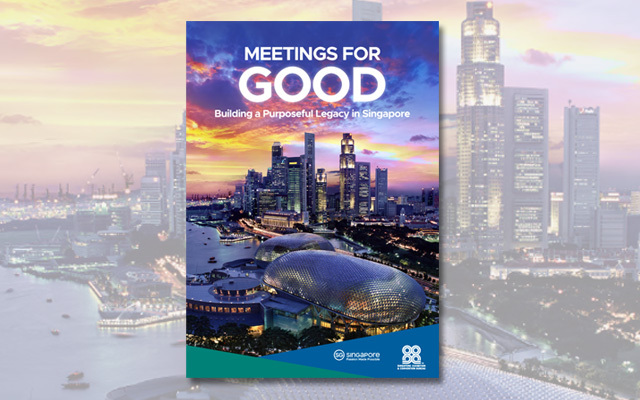Paving the way for a greener and more sustainable future for business events, the Singapore Tourism Board (STB) has launched its legacy toolkit, a Singapore MICE Industry Carbon and Waste Baselining study, and announced its ambition for carbon neutral participation at international tradeshows.
These were unveiled at IMEX Frankfurt this week, where STB has committed for the first time to holding itself accountable to carbon neutral standards.

The legacy toolkit, designed to assist stakeholders in understanding legacy and impact, and in creating their own, contains a clear framework titled, FIRM – Frame, Ideate, Realise, and Measure.
Specifically, the toolkit encourages planners to Frame their vision, Ideate their initiatives, Realise action plans and Measure impact. It also contains case studies to inspire legacy possibilities in Singapore. The legacy planning process aims to foster greater engagement between event organisers, venues, local communities and stakeholders. This includes working with established community organisations and institutions that serve as local points of contact to provide support and resources.
The National Volunteer and Philanthropy Centre is a prime example of such an institution in Singapore, providing valuable networks and expertise to build an inclusive and caring society.
Taking its commitment to responsible business events further, where carbon and waste are reduced and managed, Singapore has commenced a national MICE Industry Carbon and Waste Baseline exercise in 2023 to study the business industry’s environmental impact, thus meeting one of the targets outlined in the MICE Sustainability Roadmap announced by STB in 2022.
Through this study, an aggregated baseline of sustainability data points was established, focusing on energy, water and waste. These metrics can be consistently measured and are aligned with the global Net Zero Carbon Events Methodology. The findings revealed that the average business event venue-related carbon emissions per attendee stand at 14.13kgCO2; and a large proportion, 94 per cent of business event venue-related emissions, comes from energy.
Collected data will assist STB and the industry to track carbon emissions baselines regularly, and insights gained will be instrumental in driving waste reduction and decarbonisation strategies for positive environmental outcomes.
STB will also adopt a pioneering role in understanding carbon emissions when participating in international tradeshows for the business events sector. Its first move is with IMEX Frankfurt 2024, and will continue through other key international tradeshows from 2024, namely IMEX America and IBTM World.
For IMEX Frankfurt 2024, STB worked towards carbon neutrality by choosing direct flights instead of connecting flights, staying in with good sustainability practices/sustainability certifications, working with suppliers with good sustainability practices and supply chain decarbonisation process, reusing materials for the construction of the Singapore pavilion, and prioritising public transport or foot commute to the show hall.
All 34 Singapore pavilion partners were also briefed on sustainable best practices and have committed to minimising their carbon footprint while at the tradeshow.
Commenting on these initiatives, Yap Chin Siang, STB’s deputy chief executive, said: “Since the launch of the MICE Sustainability Roadmap in 2022, the Singapore Tourism Board has remained steadfast in our commitment to fostering a more sustainable and impactful MICE industry. We are pleased to share that the initiatives we unveil today will not only steer the MICE industry towards a more sustainable future, but also provide tangible ways in which event organisers and planners can make meaningful, lasting impact in Singapore. We will continue to collaborate with stakeholders and uphold our ambition to be the World’s Best MICE City.”











